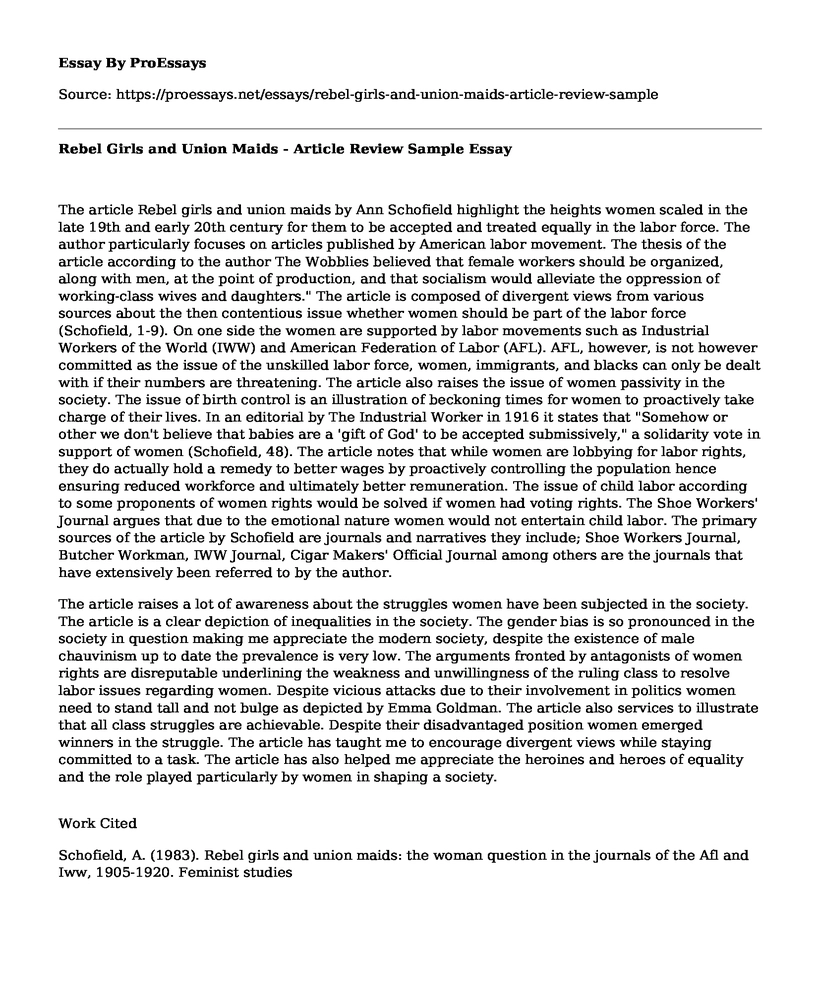The article Rebel girls and union maids by Ann Schofield highlight the heights women scaled in the late 19th and early 20th century for them to be accepted and treated equally in the labor force. The author particularly focuses on articles published by American labor movement. The thesis of the article according to the author The Wobblies believed that female workers should be organized, along with men, at the point of production, and that socialism would alleviate the oppression of working-class wives and daughters." The article is composed of divergent views from various sources about the then contentious issue whether women should be part of the labor force (Schofield, 1-9). On one side the women are supported by labor movements such as Industrial Workers of the World (IWW) and American Federation of Labor (AFL). AFL, however, is not however committed as the issue of the unskilled labor force, women, immigrants, and blacks can only be dealt with if their numbers are threatening. The article also raises the issue of women passivity in the society. The issue of birth control is an illustration of beckoning times for women to proactively take charge of their lives. In an editorial by The Industrial Worker in 1916 it states that "Somehow or other we don't believe that babies are a 'gift of God' to be accepted submissively," a solidarity vote in support of women (Schofield, 48). The article notes that while women are lobbying for labor rights, they do actually hold a remedy to better wages by proactively controlling the population hence ensuring reduced workforce and ultimately better remuneration. The issue of child labor according to some proponents of women rights would be solved if women had voting rights. The Shoe Workers' Journal argues that due to the emotional nature women would not entertain child labor. The primary sources of the article by Schofield are journals and narratives they include; Shoe Workers Journal, Butcher Workman, IWW Journal, Cigar Makers' Official Journal among others are the journals that have extensively been referred to by the author.
The article raises a lot of awareness about the struggles women have been subjected in the society. The article is a clear depiction of inequalities in the society. The gender bias is so pronounced in the society in question making me appreciate the modern society, despite the existence of male chauvinism up to date the prevalence is very low. The arguments fronted by antagonists of women rights are disreputable underlining the weakness and unwillingness of the ruling class to resolve labor issues regarding women. Despite vicious attacks due to their involvement in politics women need to stand tall and not bulge as depicted by Emma Goldman. The article also services to illustrate that all class struggles are achievable. Despite their disadvantaged position women emerged winners in the struggle. The article has taught me to encourage divergent views while staying committed to a task. The article has also helped me appreciate the heroines and heroes of equality and the role played particularly by women in shaping a society.
Work Cited
Schofield, A. (1983). Rebel girls and union maids: the woman question in the journals of the Afl and Iww, 1905-1920. Feminist studies
Cite this page
Rebel Girls and Union Maids - Article Review Sample. (2021, Apr 05). Retrieved from https://proessays.net/essays/rebel-girls-and-union-maids-article-review-sample
If you are the original author of this essay and no longer wish to have it published on the ProEssays website, please click below to request its removal:
- Communication Theory Essay: Social Penetration Theory
- Paper Example on Johari Window Model
- A True Friend Essay Example
- Paper Example on Waging a Living: Does Work Provide Enough for Working Americans?
- Athletes' Activism: Raising Awareness and Fighting Injustice - Essay Sample
- Paper Sample on Socrates and Meno Debate Virtue: Is It Teachable?
- The Impact and Influence of Andrew Carnegie on the American Culture and Society - Essay Example







